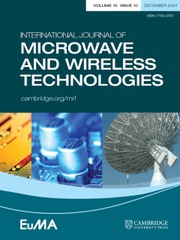No CrossRef data available.
Broadband circularly polarized slot antenna arrays using linked elliptical slots for C- and X-band applications
Published online by Cambridge University Press: 26 April 2018
Abstract
Compact broadband circularly polarized elliptical slot antenna arrays (CPESAAs) are devised based on 2 × 2 and 4 × 4 circularly polarized (CP) elliptical slot antennas and a sequential phase feed network. To realize the circular polarization, eight rectangular stubs are embedded in the feed structure to excite two orthogonal E vectors in 2 × 2 CPESAA configuration. Moreover, by taking four rectangular slots out from each array element, return loss and axial-ratio bandwidths are noticeably increased. The investigated simple array element has a compact size of 20 × 20 × 1 mm3. As well, 2 × 2 CPESAA occupies a compact size of 55 × 60 × 1 mm3, which operates within the frequency band 4.18–9.35 GHz. Thus, 76.4% of S11 < −10 dB and 51.4% of CP bandwidth (4.43–7.5 GHz) are covered. Moreover, proposed 4 × 4 CPESAA is printed on 110 × 110 × 1 mm3 FR4 substrate and covers the frequency band of 1.15–12.98 GHz with CP at 2.95–8.82 GHz. Throughout the study, the design process of the proposed antenna arrays are presented and discussed in detail.
Information
- Type
- Research Papers
- Information
- International Journal of Microwave and Wireless Technologies , Volume 10 , Issue 3 , April 2018 , pp. 328 - 335
- Copyright
- Copyright © Cambridge University Press and the European Microwave Association 2018

